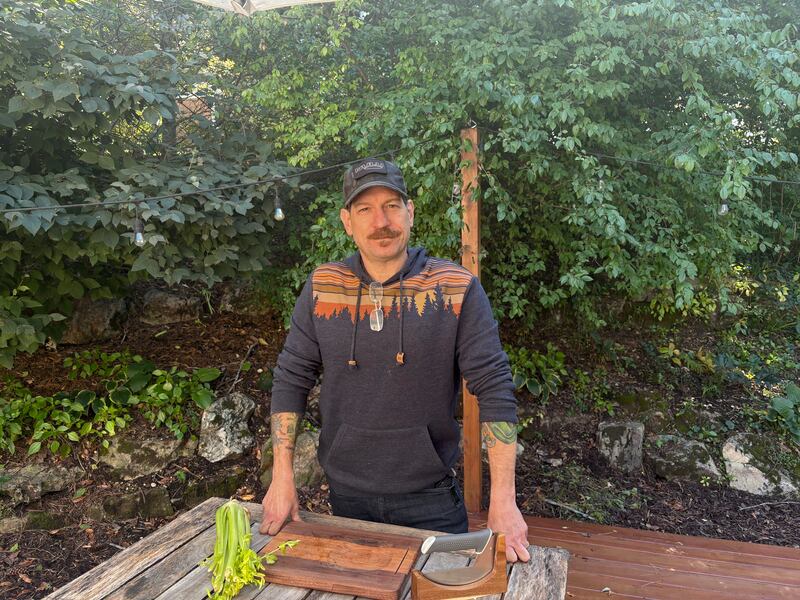When U.S. Army veteran Doug Katz found that handling a kitchen knife was challenging because of his shoulder, hand and arm pain, he decided to use his welding skills to create a completely new ergonomic design that he hoped would benefit everyone, especially those with disabilities.
After designing, redesigning and creating prototypes, the Nulu knife was born: A semi-circular knife with three cutting edges and multiple ways to grip and use for chopping, mincing, carving and slicing.
Katz, a Trout Valley resident, says the design is geared towards anyone who has trouble cutting with traditional knives, like people living with arthritis, multiple sclerosis, Parkinson’s disease and cerebral palsy. He calls it the “ability curve.”
:quality(70)/cloudfront-us-east-1.images.arcpublishing.com/shawmedia/KWC2GXYOUVELRONSDET66C6Q2Q.jpg)
“Disability is really about a task. It’s not about an identity,” he said. “So there might be a particular thing that you can’t do, but there’s an array of other things that you can.”
He based the design of his knife off of the ancient Arctic blade called the Ulu, hence the name Nulu because it’s the “new Ulu,” Katz said.
Katz describes himself as an amateur knife-smith and a cooking enthusiast. He creates knives in his garage workshop as a hobby, and started playing around with designs that could help ease the pain he experienced while preparing food.
“I look at it more as functional art,” he said.
Traditional kitchen knives force most of the energy to come from the hand, which can be difficult or impossible for people who live with limited upper mobility or weakened grip strengths. Katz designed a knife that allows for a neutral position for the shoulder, arm and hand.
He thought of the idea about three years ago, created the prototype two years ago and launched the final product to the public this year. It wasn’t until he got it the in hands of customers that Katz said he realized the Nulu could help so many other people, including those in wheelchairs and with vision impairments. He remembers seeing the joy in people cutting something on their own.
“This is something special,” he said. “This is an impact-type of invention.”
Inventor and industrial designer Gordon Downey helped Katz refine the Nulu design, which is patent-pending. Downey worked 13 years at a toy invention company before jumping on to help Katz’s project.
“I joke that he’s the John Lennon and I’m the Paul McCartney,” Katz said.
:quality(70)/cloudfront-us-east-1.images.arcpublishing.com/shawmedia/JFIWJ53VJJBMHIDM75HPKPWTYE.jpg)
The two have been neighborhood friends for years. Downey was introduced to the Nulu when Katz brought a prototype to a party and it grabbed his attention.
“I said, ‘Well, Doug, you forgot what I do. Don’t sell them out of your trunk. Let’s make them for real,’” Downey said, “because I saw a lot of potential in what he was doing.”
Katz served in the Army as an artillery officer from 1993 to 1998 in Colorado. He said he was inspired to serve because he’s a “really patriotic guy.” That inspiration trickled down to his daughter, who now is in the U.S. Coast Guard.
“I really do feel service changes people in a certain way,” he said.
Before his years in the Army, Katz attended the U.S. Military Academy at West Point in New York. Many of his Nulu team members are also veterans and West Point alumni. Katz sees strength in having a team of veterans because they always know how to pivot and confront challenges that rise up, he said.
“There’s no task you’re not going to take on,” he said.
Now the team is starting on work to design more knives that people with limited movements can use.
In the meantime, cutting boards and a dock knife holder are set to launch in November. The cutting board is designed to hold food in divots, making it easier for people cutting with one hand.
“There’s a lot of people who don’t have use of both hands to the extent that they can hold food, manipulate it and chop it at the same time,” Downey said. “It’s a lot of coordination, takes a lot of dexterity. Something that most of us take for granted.”
As the company grows, Katz hopes to get the Nulu into cooking schools and expand into the hunting and outdoor communities. So far, the challenge is educating the public while carving out a space in the kitchen knife industry.
:quality(70)/cloudfront-us-east-1.images.arcpublishing.com/shawmedia/WGPXI3LRPBC2RDLUNY6RRCBJGQ.jpg)
“Trying to cut through all that clutter is an uphill battle,” Downey said.
More information on the company and the product can be found at nuluknives.com.
